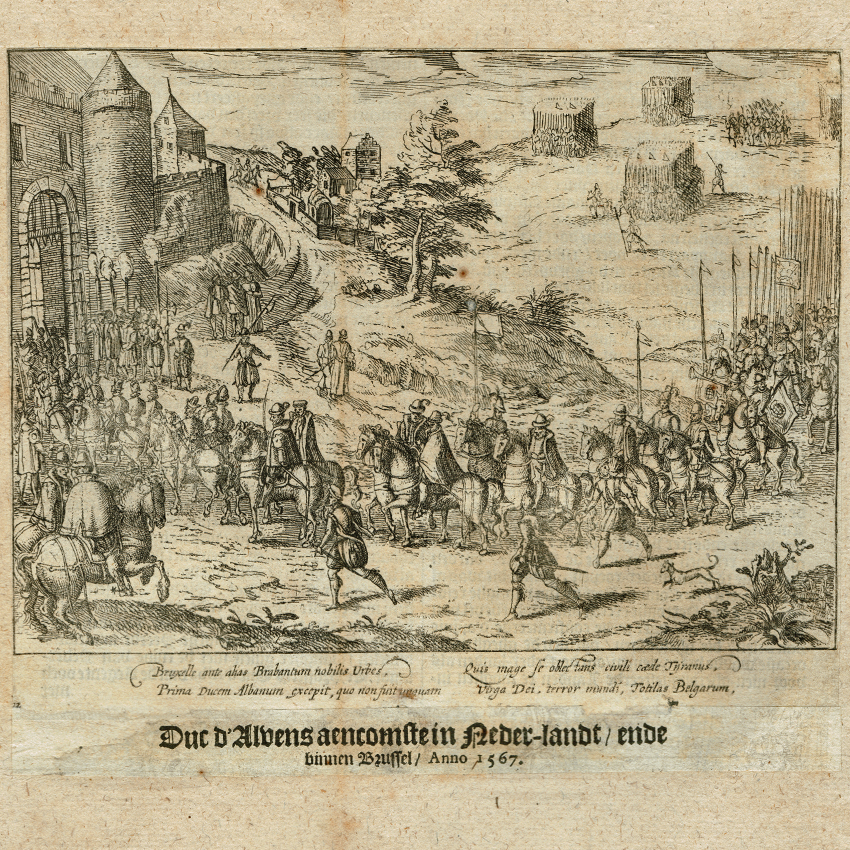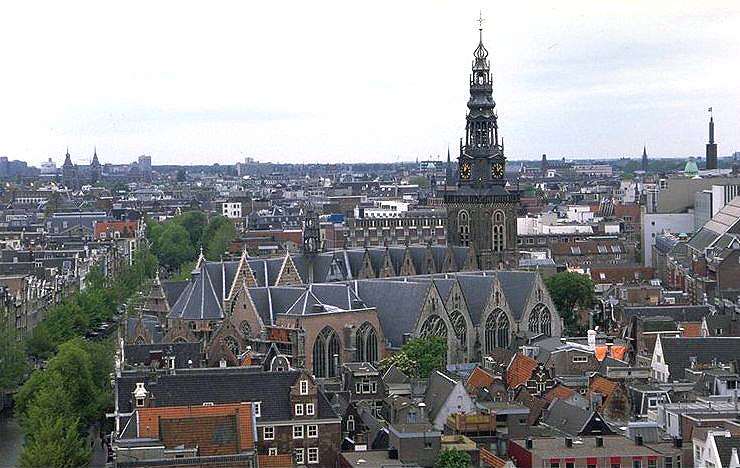|
Jacob Van Den Eynde
Jacob van den Eynde (c. 1515 – 8 or 12 March 1569) was a Dutch statesman, Pensionary of the Brugse Vrije, Pensionary of Delft, and Grand Pensionary of Holland. Jacob van den Eynde was first Councilor and Pensionary of Delft. In 1560 he became Grand Pensionary of Holland. In 1568 he was accused of heresy (or heterodoxy). His property was confiscated, and he was imprisoned by order of Maximilian of Hénin-Liétard, Count of Bossu, Stadholder of Holland and Utrecht. He was transferred to Brussels and kept in prison there while awaiting trial. Depending on the source, he died in the Treurenberg of Brussels, the Castle of Vilvoorde, or in the Koudenbergpoort before his trial even started. A year and a half after his death, he was found innocent, and his confiscated property was returned to his family. He was succeeded by Paulus Buys. Life Van den Eynde was the son of Hugo van den Eynde, Pensionary of Delft, and Lysbeth Jansdochter van der Sluys van Zijl (or Elisabeth van der ... [...More Info...] [...Related Items...] OR: [Wikipedia] [Google] [Baidu] |
Master Of Laws
A Master of Laws (M.L. or LL.M.; Latin: ' or ') is an advanced postgraduate academic degree, pursued by those either holding an undergraduate academic law degree, a professional law degree, or an undergraduate degree in a related subject. In most jurisdictions, the "Master of Laws" is the advanced professional degree for those usually already admitted into legal practice. Background on legal education in common law countries To become a lawyer and practice law in most states and countries, a person must first obtain a law degree. While in most common law countries a Bachelor of Laws (LL.B.) is required, the U.S. generally require a professional doctorate, or Juris Doctor, to practice law. The Juris Doctor (J.D.) is a professional doctorate Under "Data notes" this article mentions that the J.D. is a professional doctorate.. Under "other references" differences between academic and professional doctorates, and contains a statement that the J.D. is a professional doctorate Report ... [...More Info...] [...Related Items...] OR: [Wikipedia] [Google] [Baidu] |
Dungeons
A dungeon is a room or cell in which prisoners are held, especially underground. Dungeons are generally associated with medieval castles, though their association with torture probably belongs more to the Renaissance period. An oubliette (from french ''oublier'' meaning to ''forget'') or bottle dungeon is a basement room which is accessible only from a hatch or hole (an ''angstloch'') in a high ceiling. Victims in oubliettes were often left to starve and dehydrate to death, making the practice akin to—and some say an actual variety of—immurement. Etymology The word ''dungeon'' comes from French ''donjon'' (also spelled ''dongeon''), which means " keep", the main tower of a castle. The first recorded instance of the word in English was near the beginning of the 14th century when it held the same meaning as ''donjon''. The proper original meaning of "keep" is still in use for academics, although in popular culture it has been largely misused and come to mean a cell or "oublie ... [...More Info...] [...Related Items...] OR: [Wikipedia] [Google] [Baidu] |
Dirk Van Bleiswijk
Dirk van Bleiswijk, or Dirck van Bleyswijck (28 December 1639 in Delft – 11 September 1681 in Middelburg), was a Delft politician and writer. Biography In 1671, he became councilman or "veertigraad" in Delft, in 1672 magistrate, and in 1675 mayor. In 1681, he became a councilman in the admiralty of Zeeland. He is known for his "Description of the city of Delft" (Dutch: Beschryvinge der stad Delft), published in 1667.Dirk van Bleiswijk in the He was sickly and remained unmarried. The index and plates by Coenraet Decker of important buildings for the publication were published separately in 1 ... [...More Info...] [...Related Items...] OR: [Wikipedia] [Google] [Baidu] |
Fernando Álvarez De Toledo, 3rd Duke Of Alba
Fernando Álvarez de Toledo y Pimentel, 3rd Duke of Alba (29 October 150711 December 1582), known as the Grand Duke of Alba (, pt, Grão Duque de Alba) in Spain and Portugal and as the Iron Duke ( or shortly 'Alva') in the Netherlands, was a Spanish noble, general and diplomat. He was titled the 3rd Duke of Alba de Tormes, 4th Marquess of Coria, 3rd Count of Salvatierra de Tormes, 2nd Count of Piedrahita, 8th Lord of Valdecorneja, Grandee of Spain and a Knight of the Order of the Golden Fleece. His motto in Latin was ''Deo patrum nostrorum'' ("To the God of our fathers"). He was an adviser of King Charles I of Spain (Charles V, Holy Roman Emperor), and his successor, Philip II of Spain, Mayordomo mayor of both, member of their Councils of State and War, governor of the Duchy of Milan (1555–1556), viceroy of the Kingdom of Naples (1556–1558), governor of the Netherlands (1567–1573) and viceroy and constable of the Kingdom of Portugal (1580–1582). He represented Philip ... [...More Info...] [...Related Items...] OR: [Wikipedia] [Google] [Baidu] |
Petition
A petition is a request to do something, most commonly addressed to a government official or public entity. Petitions to a deity are a form of prayer called supplication. In the colloquial sense, a petition is a document addressed to some official and signed by numerous individuals. A petition may be oral rather than written, or may be transmitted via the Internet. Legal ''Petition'' can also be the title of a legal pleading that initiates a legal case. The initial pleading in a civil lawsuit that seeks only money (damages) might be called (in most U.S. courts) a ''complaint''. An initial pleading in a lawsuit that seeks non-monetary or "equitable" relief, such as a request for a writ of '' mandamus'' or ''habeas corpus'', custody of a child, or probate of a will, is instead called a ''petition''. Act on petition is a "summary process" used in probate, ecclesiastical and divorce cases, designed to handle matters which are too complex for simple motion. The parties in a case exc ... [...More Info...] [...Related Items...] OR: [Wikipedia] [Google] [Baidu] |
Provinces Of The Netherlands
There are twelve provinces of the Netherlands (), representing the administrative layer between the national government and the local municipalities, with responsibility for matters of subnational or regional importance. The most populous province is South Holland, with just over 3.7 million inhabitants as of January 2020, and also the most densely populated province with . With 383,488 inhabitants, Zeeland has the smallest population. However Drenthe is the least densely populated province with . In terms of area, Friesland is the largest province with a total area of . If water is excluded, Gelderland is the largest province by land area at . The province of Utrecht is the smallest with a total area of , while Flevoland is the smallest by land area at . In total about 10,000 people were employed by the provincial administrations in 2018. The provinces of the Netherlands are joined in the Association of Provinces of the Netherlands (IPO). This organisation promotes the com ... [...More Info...] [...Related Items...] OR: [Wikipedia] [Google] [Baidu] |
Spanish King
, coatofarms = File:Coat_of_Arms_of_Spanish_Monarch.svg , coatofarms_article = Coat of arms of the King of Spain , image = Felipe_VI_in_2020_(cropped).jpg , incumbent = Felipe VI , incumbentsince = 19 June 2014 , his/her = His , heir_presumptive = Leonor, Princess of Asturias , first_monarch = Isabella I of Castile and Ferdinand II of Aragon ( Catholic Monarchs of Spain) , date = , appointer = Hereditary , residence = Royal Palace of Madrid (official)Palace of Zarzuela (private) , website The Spanish Monarchy The monarchy of Spain or Spanish monarchy ( es, Monarquía Española), constitutionally referred to as The Crown ( es, La Corona), is a constitutional institution and the highest office of Spain. The monarchy comprises the reigning monarch, his or her family, and the royal household organization which supports and facilitates the monarch in the exercise of his ... [...More Info...] [...Related Items...] OR: [Wikipedia] [Google] [Baidu] |
History Of Religion In The Netherlands
The history of religion in the Netherlands has been characterized by considerable diversity of religious thought and practice. From 1600 until the second half of the 20th century, the North and West had embraced the Protestant Reformation and were Calvinist. The southeast was predominately Catholic. Associated with immigration from North Africa and the Mideast of the 20th century, Muslims and other minority religions were concentrated in ethnic neighborhoods in the cities. Since the 1960s, the Netherlands has become one of the most secular countries in the Western world. In a December 2014 survey by VU Amsterdam, more atheists (25%) were reported than theists (17%) for the first time in the history of the Netherlands. The majority of the remainder of the population identified as agnostic (31%) or ietsist (27%). Prehistory and Early Middle Ages Before the advent of Christianity, the Netherlands were populated by Celtic tribes in the South, which adhered to Celtic polythei ... [...More Info...] [...Related Items...] OR: [Wikipedia] [Google] [Baidu] |
Roman Catholic
Roman or Romans most often refers to: *Rome, the capital city of Italy *Ancient Rome, Roman civilization from 8th century BC to 5th century AD *Roman people, the people of ancient Rome *'' Epistle to the Romans'', shortened to ''Romans'', a letter in the New Testament of the Christian Bible Roman or Romans may also refer to: Arts and entertainment Music * Romans (band), a Japanese pop group * ''Roman'' (album), by Sound Horizon, 2006 * ''Roman'' (EP), by Teen Top, 2011 *" Roman (My Dear Boy)", a 2004 single by Morning Musume Film and television * Film Roman, an American animation studio * ''Roman'' (film), a 2006 American suspense-horror film * ''Romans'' (2013 film), an Indian Malayalam comedy film * ''Romans'' (2017 film), a British drama film * ''The Romans'' (''Doctor Who''), a serial in British TV series People *Roman (given name), a given name, including a list of people and fictional characters *Roman (surname), including a list of people named Roman or Romans *Ῥωμ� ... [...More Info...] [...Related Items...] OR: [Wikipedia] [Google] [Baidu] |
Netherlands
) , anthem = ( en, "William of Nassau") , image_map = , map_caption = , subdivision_type = Sovereign state , subdivision_name = Kingdom of the Netherlands , established_title = Before independence , established_date = Spanish Netherlands , established_title2 = Act of Abjuration , established_date2 = 26 July 1581 , established_title3 = Peace of Münster , established_date3 = 30 January 1648 , established_title4 = Kingdom established , established_date4 = 16 March 1815 , established_title5 = Liberation Day (Netherlands), Liberation Day , established_date5 = 5 May 1945 , established_title6 = Charter for the Kingdom of the Netherlands, Kingdom Charter , established_date6 = 15 December 1954 , established_title7 = Dissolution of the Netherlands Antilles, Caribbean reorganisation , established_date7 = 10 October 2010 , official_languages = Dutch language, Dutch , languages_type = Regional languages , languages_sub = yes , languages = , languages2_type = Reco ... [...More Info...] [...Related Items...] OR: [Wikipedia] [Google] [Baidu] |
Kindergarten
Kindergarten is a preschool educational approach based on playing, singing, practical activities such as drawing, and social interaction as part of the transition from home to school. Such institutions were originally made in the late 18th century in Germany, Bavaria and Alsace to serve children whose parents both worked outside home. The term was coined by German pedagogue Friedrich Fröbel, whose approach globally influenced early-years education. Today, the term is used in many countries to describe a variety of educational institutions and learning spaces for children ranging from 2 to 6 years of age, based on a variety of teaching methods. History Early years and development In 1779, Johann Friedrich Oberlin and Louise Scheppler founded in Strasbourg an early establishment for caring for and educating preschool children whose parents were absent during the day. At about the same time, in 1780, similar infant establishments were created in Bavaria. In 1802, Princess P ... [...More Info...] [...Related Items...] OR: [Wikipedia] [Google] [Baidu] |

_-_Dirck_Evertsz_van_Bleyswijck_at_the_Age_of_Thirty_-_WGA24600.jpg)




.jpg)